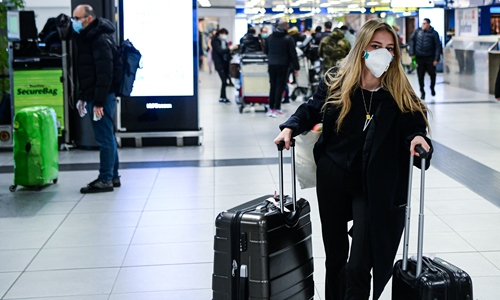HOME >> WORLD
WHO declares COVID-19 pandemic, calls for joint efforts across the globe
By GT staff reporters Source:Globaltimes.cn Published: 2020/3/12 2:27:02 Last Updated: 2020/3/12 12:59:51

A passenger wearing a protective face mask, amid concerns about the COVID-19 outbreak, walks in Linate Airport in Milan, Italy on Sunday. Photo: AFP
The World Health Organization (WHO) officially declared the novel coronavirus pneumonia (COVID-19) a global pandemic on Wednesday and called on the international community to jointly spare no efforts to stop the rapid spread of the virus.
WHO has been assessing this outbreak around the clock since it began.
"We are deeply concerned both by the alarming levels of spread and the severity, and by the alarming levels of inaction," Tedros Adhanom Ghebreyesus, WHO Director-General, said during a press briefing on Wednesday.
Shen Yi, an expert from Fudan University, said the announcement of a pandemic was disappointing.
It means that the time that China earned for the world has been wasted, Shen noted.
"The most disappointing thing is that China has been sharing its experiences with the world since the outbreak, but it seems like these experiences have been ignored as what happened in Wuhan is now reoccurring in the US," he said.
In the past two weeks, the number of cases of COVID-19 outside China has increased 13-fold, and the number of affected countries has tripled, according to the WHO.
There are now more than 118,000 cases in 114 countries and regions, and 4,291 people have lost their lives.
"We have therefore made the assessment that COVID-19 can be characterized as a pandemic," Ghebreyesus said.
The last time the WHO announced a pandemic was in 2009 when a novel influenza A(H1N1)pdm09 virus, which originated in the US, infected up to 1.4 billion people globally, or one in six of the world's population.
And the reported death toll was an inaccurate 151,700-575,400 worldwide, according to the US Centers for Disease Prevention and Control. That virus has since transformed into a seasonal flu.
This is a call-out for all countries and regions across the world to face this common threat to human beings together, Chen Xi, an assistant professor of public health at Yale University, told the Global Times on Wednesday.
"Though this announcement has no legal affect, it shows that this is not a matter concerning certain countries only, but the whole international community, requiring everyone to mobilize, coordinate resources and share information," he said.
More importantly, countries should be more active in rolling out measures to prevent the disease from spreading rapidly, which remains the major task, Chen noted.
Countries should take action before it's too late, because if the disease spreads out of control globally, the impacts would result in significant economic losses, analysts warned.
According to the WHO, pandemics can affect a large proportion of the global population and put significant stress on healthcare systems. A moderate or severe pandemic will also strain other essential services and cause substantial social and economic impacts.
"Pandemic is not a word to use lightly or carelessly. It is a word that, if misused, can cause unreasonable fear, or unjustified acceptance that the fight is over, leading to unnecessary suffering and death," Ghebreyesus said.
Several countries have demonstrated that this virus can be suppressed and controlled, but the challenge for many countries who are now dealing with large clusters or community transmission is not whether they can do the same - it's whether they will, the WHO chief noted.
"We have called every day for countries to take urgent and aggressive action. We have rung the alarm bell loud and clear," said Ghebreyesus.
The whole of humanity is facing a common threat now from the novel coronavirus, Shen noted, adding that the WHO announcement is a signal that no time can be wasted on political games and the international community should unite together to fight against the epidemic.
Posted in: CROSS-BORDERS